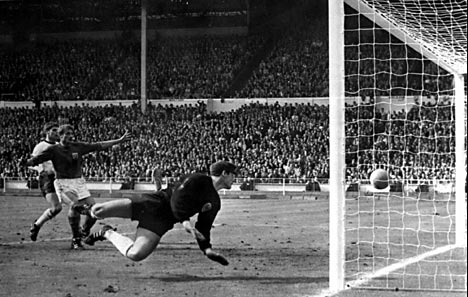
The cosmic karma of "what goes around comes around" struck England versus Germany on Sunday at the World Cup. England was denied a legitimate goal when the ref failed to see the ball bounce over the German line. In the World Cup Final in 1966 (photo above), the tables were turned when England robbed Germany in similar circumstances (details below). It is the hottest debate in soccer. Should the referee be able to examine video replay to judge a call correctly?
The Pros
Fairness - Argentine soccer legend Diego Maradona is remembered as the instigator of the notorious Hand of God incident at the 1986 World Cup Finals in Mexico. The cameras captured his villainy, when he deliberately used his hand to score, but the match officials failed to see it. Argentina went on to win the tie against England, and proceeded to win the World Cup. Later, Maradona praised God for blinding the referee at the crucial moment.
No More Shouting at the Referee - In soccer, blaming the ref is a tradition. The fans sing nasty songs about the man in the middle. He endures much abuse and threats. And when players join in, it gets ugly. At the end of the semi-final of the 2009 Champions League playoff between Chelsea and Barcelona, Chelsea striker Didier Drogba wildly attacked the referee for refusing a penalty claim, after a Barcelona player had handled the ball inside the penalty area. The official was escorted from the stadium under police guard. Drogba was suspended from playing in future games. A television replay would have settled the matter.
Stop claims of official bias - The World Cup Final, England v West Germany, London 1966. England's Geoff Hurst strikes the ball off the underside of the bar. As fast as a bullet, it lands over the line, if you are English, and on the line if you are German. The referee looks to his assistant linesman for clarification. The Russian linesman looks to the Queen of England sitting in the stands. Maybe he saw his head on a pike at the Tower of London. He indicates a goal. On his deathbed, he confesses. He didn't like Germans much. He remembered World War ll. The film showed that Germany was cheated.
The Cons
Interrupting the Game - Video replay will interrupt the pace and momentum of the free flowing game. And once the camera starts officiating, the demands for more intrusion will get louder.
The Loss of Injustice - Every soccer fan has said it: "We were robbed." Being cheated out of victory by bad calls is part of the lore. And it helps maintain grudges and rivalries, very much part of the soccer tradition. Subsequent clashes between Argentina and England would not have been as bitter, nor as exciting for the fans, had video replay severed Maradona's Hand of God.
No More Shouting at the Referee - Those nasty chants raining down on the hapless ref from thousands in the stands - "The referee's a wanker" is the usual cheery sing-a-along. Soccer is nothing without the affronted atmosphere. Wrong ref calls are the lightning that comes before the thunder. Anyone who has been to a big soccer game knows how glorious it feels to be struck by it and to publicly eviscerate officialdom.
You decide
What do you think? The video ref may balance the scales of justice but might reduce the fever that is soccer. Making a call on whether to have video replay, may prove as difficult as answering the question all referees fear, did the ball cross the line?
Alan Black is the co-author of The Glorious World Cup
